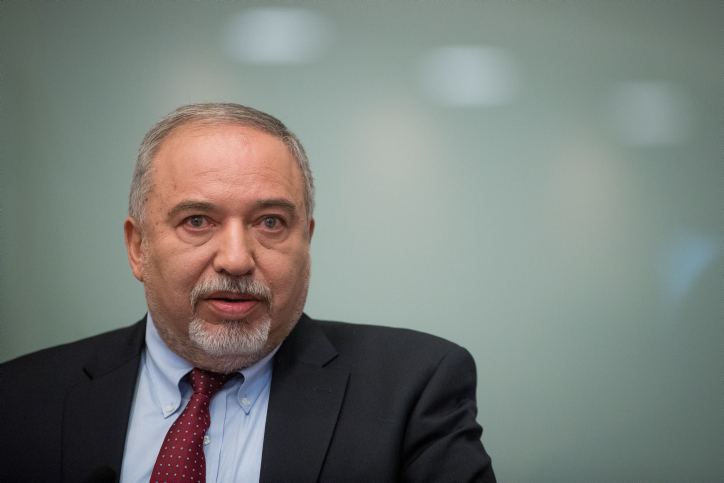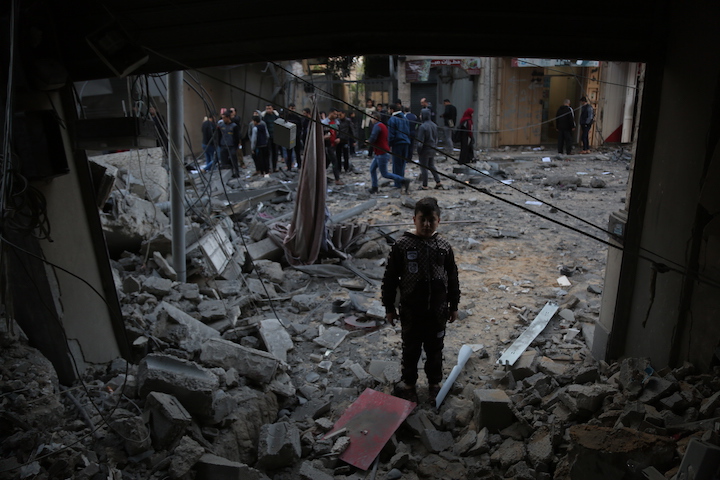The resignation of Defense Minister Liberman could very well trigger elections as early as next March. Many will be going the polls with one question in mind: how much force should we use against Palestinians?

Israel appears to be going to early elections. Defense Minister Avigdor Liberman on Wednesday announced that he is resigning from his post, and that his party, Yisrael Beytenu, will leave the ruling coalition over what he called Netanyahu’s “surrender to terrorism.” The surprise resignation came just a day after Israel and Hamas agreed to a cease-fire, ending the most violent flare-up the Gaza border has seen since the 2014 war.
Immediately following his announcement, the right-wing Jewish Home party — Liberman’s main competition for the title of “most hawkish” in the government — released a statement that it too would leave the coalition unless party leader Naftali Bennett replaces Liberman as defense minister. It is unlikely Netanyahu will agree to such conditions, which means that his coalition will probably fall apart, ushering in early elections in the spring of 2019, instead of their original date in November 2019.
Liberman’s move makes perfect sense, if one considers that his party, which holds only five of 120 seats in the Knesset, might not make it past the election threshold, as several polls have indicated (Liberman, ironically, was behind the effort to raise the threshold in an attempt to keep Arab parties out of the parliament). Leaving office and blaming Netanyahu for being too soft on Hamas may just be his ticket for political survival.
Liberman also used his podium to attack Netanyahu for backing down on the demolition of Khan Al-Ahmar, allowing Qatari cash and fuel into Gaza, and the latest cease-fire. Less than a day after Likud supporters demonstrated against Netanyahu in the southern city of Sderot, demanding harsher retaliation in Gaza after over 400 rockets were launched from the Strip into Israel, Liberman is now relying on public resentment toward the prime minister’s “lenient” response – which had the support of all the heads of the security establishment.
If this is indeed the launch of the 2019 national election campaign, it means Israelis could be going to the polls as early as March with one question before them: how much force should we use against Palestinians? Judging by the past 24 hours, the answers most political parties will offer will range from “a lot” to “a lot more.”
Liberman and Bennett weren’t alone in criticizing Netanyahu’s “caving in” to Hamas — supposedly centrist leaders such as Yair Lapid and former Prime Minister Ehud Barak, alongside other members of the Labor Party, also attacked the prime minister for his conduct. Confronted by such hawkish responses from political adversaries right and left, Netanyahu might feel forced to initiate some sort of military action, either in Gaza, the West Bank, or on the northern front vis-à-vis Iran in Syria, or Hezbollah in Lebanon. As long as he can save face and maintain his image as a bold commander-in-chief.

Even if by some unexpected turn of events Netanyahu’s coalition survives the turmoil with a razor-thin majority of 61 (out of 120) Knesset seats, recent developments are still very indicative of the current state of affairs in Israeli political discourse. Besides Jewish Home, with its outspoken agenda of annexing the the West Bank, the left-wing Meretz party and the Joint List, which strongly support a two-state solution, the majority of parties in or running for Knesset do not have any platform for how to end the conflict with the Palestinians. None are seriously willing to support a two-state solution, including possible negotiations with either the PLO or Hamas, and an end to the occupation and the siege on Gaza. A one-state solution is not even in the cards.
The only option that most parties seem to agree on, even if unofficially, is maintaining the status quo with variable levels of settlement expansion in the West Bank, and the severity of the siege on Gaza. Even Liberman has nothing else to offer. The sad truth is that the Jewish-Israeli public is only really divided over the degree of violence to be used against the Palestinians — all while keeping the status quo intact.

